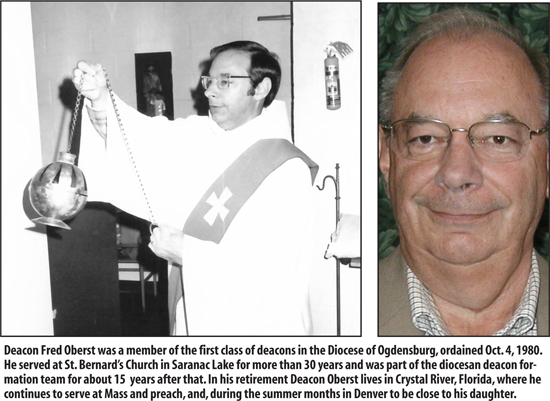Oct. 11, 2017 By Deacon Fred Oberst When new deacons by the thousands across the country become ordained they begin their real education. New men who were not yet as fortunate to become deacons may continue their arduous journey from layman to become ordained. In both cases, some will be highly successful and some will not. What differentiates those who reach the pinnacle and those who struggle? The path to becoming an exceptional deacon is not automatic. Deacon leadership is not randomly assigned simply because an individual has a degree or because he has invested the time and gained seniority. The skill set that defines a successful deacon is different from that of an accomplished pastor, different from a graduate with a high grade point average, different from most anyone else in the world of Roman Catholic Clergy. To be a deacon, a really exceptional deacon requires a breadth of knowledge, that spans the gamut from a full understanding of ministry, a heart that cares beyond a single cause, a broad biblical knowledge of church history and practice, a psychologist’s understanding of what makes people tick, a keen eye on current events, an ability to deliver prayers to suit countless environments and needs, the communication skills of a TED presenter, and the business savvy of a company CEO. With this in mind, the ordained deacon or member of a formation program is faced with developing a path to his future. This will take a significant amount of planning, a methodical timeline, and loads of hard work. So, what are the stops along the way to becoming an exceptional deacon? This is a partial list from observations of deacons who are truly exceptional at what they do. Have patience To the newly ordained, your ordination is the price of admission. It will, and should take years before you are ready to take on the role of exceptional deacon. To the graduates of the school of hard knocks – you are on a level playing field with graduate scholars as long as your way to the goal reflects what your current training lacks. Align yourself with the best There may be only one skill from another’s bag of tricks that you want to assimilate, but working without aligning yourself with that individual, your skill set will be lacking. Know who these individuals are, research why they are successful, make contact and humbly ask for the opportunity to learn from them. Seek to learn something new Experience other cultures Moving is scary and challenging, but invigorating at the same time. You can always return to your roots at a later date. Be daring – seek opportunities to work with a diverse team of religious groups. This cultural immersion will help to build your skills and, even more importantly, your understanding of other people. Dorothy Day, with no intention of being a saint, lived with the poorest of the poor when she oversaw Catholic Worker Houses in the Archdiocese of New York. Matthew Kelly, best- selling author, brings witness to the power of God’s Mercy in “Beautiful Mercy” an invitation to rediscover God’s unconditional love so you can share it with others. Re-discover your heritage Give more than you receive Find those people you admire for their skills and dig into their methods. If you associate with energetic, passionate, focused, and hard-working individuals you will find a constant source of inspiration and drive. Associate with people who make you work with a renewed level of determination. If you don’t know, found it out Great deacons understand that they can never know everything and others may very well have the answer that they are looking for. Listen to employers, employees, friends, adversaries, church experts, and Sunday visitors. Good listeners are better decision makers. Work harder than others Work smarter Spending 15 minutes every day helping out the secretary or the maintenance staff is a great investment in teambuilding. Spending more time each day at this task is a failure to understand that your skill set is needed elsewhere. Delegate, teach, train, critique and demonstrate how to improve, inspire and recognize if you want to be an exceptional deacon. Learn something new Never forget where you began Check your ego at the door Be proud of what you have accomplished but leave those inflated egos at the door. Leaders need followers who are willing and excited about doing just that – following. No one has any interest in succumbing to a person who feels that they are more important than anyone else. |
||||


